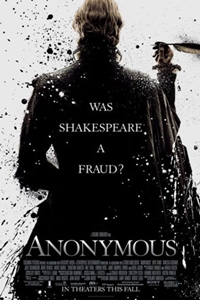Anonymous (2011) (PG-13) ★★
 For nearly 100 years, experts in historical and literary fields have been debating the authenticity of William Shakespeare's master works. Was he really a storytelling genius who single-handedly crafted a vast body of poems and plays? Or were they actually the works of another unnamed author? Could a group of playwrights have written under a sole moniker? Director Roland Emmerich dives headfirst into this century-old debate with his new movie Anonymous, piecing together evidence to unravel the mystery with dramatic flair. Unfortunately, the only thing he discovers in the process is that the answers aren't that interesting.
For nearly 100 years, experts in historical and literary fields have been debating the authenticity of William Shakespeare's master works. Was he really a storytelling genius who single-handedly crafted a vast body of poems and plays? Or were they actually the works of another unnamed author? Could a group of playwrights have written under a sole moniker? Director Roland Emmerich dives headfirst into this century-old debate with his new movie Anonymous, piecing together evidence to unravel the mystery with dramatic flair. Unfortunately, the only thing he discovers in the process is that the answers aren't that interesting.
The movie centers on Edward De Vere (Rhys Ifans), a scholarly gentleman forced as a youngster into the role of Earl of Oxford. While Edward prefers to spend his time waxing poetically and bringing theatrics to life for the adoring Queen Elizabeth (Joely Richardson), his caretaker, the sinister, mustache-twirling-without-a-mustache William Cecil (David Thewlis), authoritatively directs him on the path of the aristocracy. But that doesn't stop De Vere from toiling over his written work, spending years crafting plays and poems in-between canoodling with the Queen (for shame!).
As a grown man, De Vere finds himself married off to Cecil's daughter, battling the tired advisor and his hunchback son (Edward Hogg) all while continuing to write and attend the common man's theater. During one such excursion, the Earl crosses paths with playwright Ben Johnson (Sebastian Armesto), who De Vere sees as the perfect representative to take ownership over his plays, hoping they can finally be brought to life on stage. Of course, Johnson realizes slapping his name on De Vere's works of genius would put the kibosh on his own career, so he hands them over to his horny, drunk, actor friend, William t (Rafe Spall). The staged plays are a hit, but their appeal to the masses is a red flag to the court. Cecil commences a hunt for the true author of Shakespeare's plays, landing De Vere in hot water.
Emmerich intertwines De Vere, Johnson and Shakespeare's quest for theatrical fame with political unrest and romantic subplots, but none of the story arcs have the spark of a real mystery/thriller. The director and his screenwriter John Orloff (The Guardians of Ga'hoole) aim to replicate The Bard's tragic, character-driven plays with their own story, relying on performance and dense dialogue to entrance the viewer. But Emmerich goes so far out of his way to restrain himself from his usual eye for end-of-the-world destruction (made famous in Independence Day, Godzilla, The Day After Tomorrow, 2012…) that the movie trudges along without an ounce of intrigue. It's almost as if Anonymous strives to be purposefully boring, Emmerich attempting to deliver performance-first directing, but ending up with string of flat, sloth-paced back-and-forths. He does manage to squeeze a few action scenes into the mix—De Vere fends off an attacker in a thrilling, confined swordfight—but even the bigger moments feel muted.
The creative duo's grounded tactics do occasionally payoff, thanks to a solid cast led by powerhouse thespian Ifans. Anonymous luxuriates in Elizabethan history and royal affairs, presented in a fashion only a few steps up from your run-of-the-mill high school text book, but Ifans steps in and turns hammy exposition into lyrical dialogue. While he doesn't have the power to make it all register, Ifans makes the experience of Anonymous worth seeing and hearing. One transcendent moment shows De Vere crumbling in front of his wife, explaining his instinctual need to write. The monologue is powerful—but the surroundings created by Emmerich fail to support him.
The rest of the ensemble does their best to wrangle our attentions—the legendary Vanessa Redgrave as the older, repressed Queen Elizabeth and Spall's lively, arrogant Shakespeare are standouts—but the lingering question of ''why does this matter?'' continually stands in the film's way. The works of William Shakespeare are a foundation for the dramatic arts, a staple of literary education and a testament to the power of written word. After 500 years, his plays continue to be relevant, embodying the full spectrum of human emotion. So it's understandable why Roland Emmerich would embark on an expansive, blockbuster dissection behind the truth of these achievements. But Anonymous only manages to present plausible events, never tackling the weight of those accusations dead on. Going head to head with The Bard should live up to the existing body of work. Anonymous, on the other hand, feels abridged.
Hollywood.com rated this film 2 stars.
To get the full Quicklook Films experience, uncheck "Enable on this Site" from Adblock Plus
box office top 10

Civil War Released: April 12, 2024 Cast: Kirsten Dunst, Wagner Moura 11.1M

Abigail Released: April 19, 2024 Cast: Melissa Barrera, Dan Stevens 10.2M

Godzilla x Kong: The New Empire Released: March 29, 2024 Cast: Rebecca Hall, Brian Tyree Henry 9.5M

The Ministry of Ungentlemanly Warfare Released: April 19, 2024 Cast: Henry Cavill, Eiza Gonzalez 9M

Spy x Family Code: White Released: April 19, 2024 Cast: Takuya Eguchi, Saori Hayami 4.9M

Kung Fu Panda 4 Released: March 8, 2024 Cast: Jack Black, Viola Davis 4.6M

Ghostbusters: Frozen Empire Released: March 22, 2024 Cast: Paul Rudd, Carrie Coon 4.4M

Dune: Part Two Released: March 1, 2024 Cast: Timothée Chalamet, Rebecca Ferguson 2.9M

Monkey Man Released: April 5, 2024 Cast: Dev Patel, Sikandar Kher 2.2M

The First Omen Released: April 5, 2024 Cast: Nell Tiger Free, Bill Nighy 1.7M






